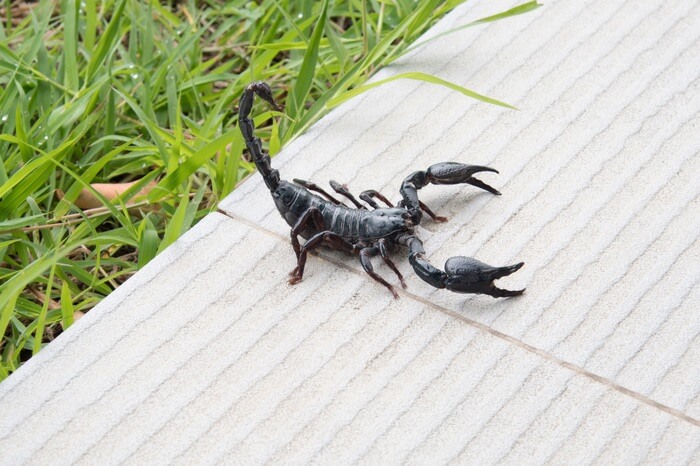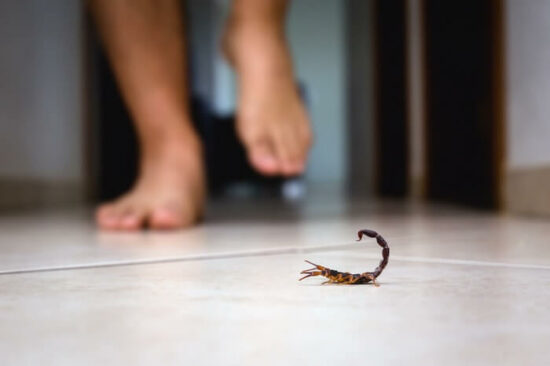Finding a scorpion in your house can be quite the nerve-wracking experience. These little critters have a menacing look that can spook even the toughest homeowner!
This guide will go over how scorpions get in the house, and what you can do about it.
Table of contents
How Do Scorpions Get In The House?
Scorpions are not like other common household pests. These animals usually don’t seek out homes in search of food or water.
While survival resources are always a nice perk, a home isn’t the first place these eight-legged arthropods go to find it. Comparatively speaking, there are much easier places to find those essentials.
So, what attracts scorpions to your home? In many cases, it’s the shelter your property provides that’s most appealing. Scorpions are common in dry, desert-like regions. They’re most prevalent in the Southwest, where the weather outside can be challenging.

Despite their overall hardiness, scorpions are not immune to the effects of extreme weather. Scorching heat, times of drought, and heavy rains force these stinging pests to seek shelter many times of the year. Even cold spells will make their everyday living conditions uninhabitable.
Human-made structures serve as a haven for scorpions looking to stay safe from Mother Nature. Your home is likely a temporary stop on their ongoing trek to survival. Most scorpions don’t plan to stick around for too long, as they rarely return to the same sleeping spot as the night before.
Quick Tip: These critters don’t nest, either. They might move from one spot to the next, but scorpions usually only use homes as a temporary means of shelter.
Where Do Scorpions Live In Your House?
There’s no better place for scorpions in your house to hide than spots that mimic their natural living conditions. Scorpions prefer to stay in areas that are dark and cool during the day. Adults are primarily nocturnal, choosing to use the cover of night to find food.
They’re also not keen on being around humans. As a result, you’re more likely to find scorpions in dark places that you don’t frequent very often. Some common scorpion stomping grounds include attics, basements, and crawl spaces. Many find them living in sheds and accessory buildings, too.
Where scorpions live in your house will depend on the reason for being there. As we mentioned earlier, scorpions usually only enter homes to get some relief from the harsh weather conditions outside.
If you’re dealing with a sweltering summer, don’t be surprised if you find these menacing pests near water sources. You might see them in the bathroom or kitchen.
Those are the most likely places to encounter a scorpion, but these cunning arthropods can pop up anywhere. In many cases, they make their way indoors after hitchhiking on other objects. They have a knack for hiding in cardboard boxes, woodpiles, grocery bags, and other outdoor items you bring inside.
Quick Tip: Scorpions will use other means to squeeze their way through if they don’t come in through hitchhiking. Believe it or not, these animals are capable of flattening their body to about 1/16 of an inch tall! As you can imagine, that physical characteristic provides many entry opportunities.
Scorpions can wriggle their way under windows, doors, and gaps. They’re notorious for squeezing their way through voids between door or window jambs.
Once inside, scorpions will immediately look for shelter. If they can’t get to the basement or attic right away, they might hide in nearby bags, boxes, or shoes.
What To Do If You Find A Scorpion In Your House
It’s perfectly reasonable to be wary of scorpions in your house! With their intimidating looks and the capability to sting, you should never ignore a potential infestation.
When you spot its signature stinger and eight-legged build, here are a few things you can do to get rid of it.
Trap Them In A Jar And Bring Them Outside
First things first, dealing with a scorpion you find in your house requires you to keep calm and take action. When many people see a scorpion, they automatically go into panic mode. There are a lot of horror stories out there about what these critters can do!
The good news is that scorpions aren’t going to attack you unless provoked. They’re solitary creatures that would much rather scurry away than face confrontation. It’s only when they have no other choice that they stand their ground and use their stingers for defense.
There’s another piece of trivia that will provide peace of mind. Only two scorpion species can cause real damage in the United States. The bark scorpion and the striped-bark scorpion are the only known variants with venom potent enough to cause severe issues. Fortunately, hospitals in areas where these scorpions live usually have appropriate antivenom to deal with stings.
Quick Tip: Other venomous species exist in other parts of the world as well. However, those two are the only ones most people have to be wary of on their property.
Now, that doesn’t mean that other scorpion stings won’t hurt. However, the risks are no greater than that of a wasp or bee!
Hopefully, those nuggets of information will give you the confidence to take action!
When you spot a scorpion in your home, one of the best things you can do is trap it. A glass jar works just fine, but you can also utilize large plastic containers. Deep dust pans work well, too.
It’s a good idea to wear cut-proof gloves and garments if possible for good measure.
Once you capture the scorpion, gently bring it outside and release it! Scorpions are ecologically beneficial, as they can hunt and kill other problematic insects. Moving them outside ensures that you can still reap the rewards while keeping a healthy distance away.
Sweep Them Up
Many homeowners that live in scorpion-prone areas sometimes keep brooms and dustpans in multiple rooms. They’re not just for cleaning! Brooms are an excellent tool to have in your fight against scorpions.
Keep a broom in rooms that these pests might frequent. It’s a good idea to have one in the attics, basements, and sheds.
When you find a scorpion in your house, use the broom to sweep it into a dustpan. A deep dustpan with a cover is best, as it provides as much separation between you and that menacing stinger as possible. Shallow dustpans won’t cut it.
A dustpan ensures that the scorpion can’t climb out and get aggressive.
Be as quick as you can! Scorpions can move up to 12 MPH, so they’re fast enough to duck out of sight. Should the scorpion climb up the wall, use the broom to push it off and onto the floor.
If you’re not fast enough to catch the scorpion, try using a UV light. Its exoskeleton glows brightly under a UV light, making it very easy to spot. Not only that, but these pests typically duck and cover.
Then, they’ll sit and wait for the threat to go away. Once you find the scorpion again with the UV light, slowly catch them by surprise and sweep them up.
Once again, you can release them outside. The dustpan should make that job pretty simple. Choose a spot that’s far away from any potential entrances to avoid future issues.
Kill Them
If all else fails, you can always kill the scorpions you see.
There are many ways to do this. The easiest is with a solid shoe and plenty of stepping force! Despite their strong exoskeletons, scorpions are no match for an old-fashioned squish.
Quick Tip: For good measure, it’s a good idea to stab them with a sharp object. Remember, scorpions can flatten themselves. While that act is usually reserved for getting into tight spots, they can use it to evade death.
As always, be careful here! If you’re not quick and responsive enough, scorpions could scurry away or try to climb up your leg for a sting!
If you prefer a more hands-off approach, pesticides are available as well. Both synthetic and natural pesticides are available. In parts of the country where scorpions are expected, you can usually find plenty of targeted products that are tailor-made for dealing with scorpions you find in your house.
Follow the instructions on the package or hire an exterminator to do the job for you. Either way, pesticides are very effective. Some also provide instant results, giving you an option should you have an unexpected run-in with a scorpion in your home.
Sticky traps and other physical deterrents can help, too. The goal here is to prevent the scorpion from moving around your home. They eventually starve and die with no intervention from you whatsoever.
How To Prevent Them From Coming Back
While scorpions don’t set up nests in homes, they could quickly return when conditions get challenging outside. To prevent future infestations, you have to be proactive about making your property as unappealing and impenetrable as possible.
Start by sealing up any potential access points that scorpions can use to enter your home. Don’t leave any stone unturned or crack unfilled! Their ability to flatten their bodies makes even the most unassuming void a possible point of entry.
Quick Tip: Pay close attention to door and window jambs. A high-quality caulk or mortar mixture should be more than enough to seal up any crack you see. It’s a good idea to replace any damaged window screens and cracked weatherstripping, too.
Don’t forget to give your exterior walls a thorough inspection as well, as you might reveal potential hideouts.
Scorpions can take advantage of weep holes, roof eaves, and plumbing fixtures as well. Weep holes are standard in brick homes, as they provide an escape route for water. Those holes are necessary to avoid water damage, but you can limit scorpion entry by installing mesh or protective wire.
Once you secure your home, focus your attention on the yard itself.
Scorpions will use clutter on your property as a cozy hiding spot during the day. One of the best ways to prevent scorpion issues is to limit those comfort areas. Pick up garbage, yard debris, and construction material.
Don’t let anything pile up on your property. If you have no choice but to gather items, keep those piles away from exterior walls. Store piles of firewood several yards away from your home and keep them off the ground to make it difficult for scorpions to access.
As far as yard maintenance goes, keep things tidy! Mow your lawn regularly, prune shrubs to prevent overgrowth, and rake up debris whenever necessary. Do your best to keep your property looking clean, presentable, and open. Fewer shade spots will force scorpions to look elsewhere for shelter.
Finally, let’s talk about some simple lifestyle changes you can make to keep scorpions out.
As we touched on earlier, scorpions often make their way into your home by hitchhiking on items you bring inside. Try not to leave objects outside for too long to mitigate the risks of inadvertently carrying a scorpion with you.
Shoes, boots, and boxes are likely offenders. However, scorpions can also find a way to hide in clothes.
If you need to leave items outside, keep them off the ground. These creatures can still find a way to get in, but most will ignore things that aren’t directly accessible.
For firewood, only bring in pieces that you plan on putting directly into the fire. Don’t let the wood sit inside for even a few minutes. If any scorpions are hitchhiking, they’ll burn in the fireplace!
Lastly, change the way you store towels, shoes, and wet garments. Get used to hanging shoes upside down on a rack. While not wholly scorpion-proof, upside-down shoes will make things more difficult for these pests to hide.
For wet towels or clothes, hang everything up! Scorpions will immediately flock to wet fabrics on the floor because they provide easy access to moisture. Hanging those items will make them inaccessible to scorpions while also speeding up drying times.
There’s a lot that you can do to keep scorpions out. The menacing arthropods will do all they can to find shelter when they need it. To prevent scorpions from ending up in your house, adopt these tips and make your living space as unappealing to scorpions as you can.
I Found A Scorpion In My House, Are There More?
Scorpions are unique to ants, cockroaches, and other common household pests. Unlike those insects, scorpions prefer to live solitary lives. They may group up occasionally to mate and further their population. However, finding more than one scorpion in the house is very rare!
They’re territorial by nature, creating automatic separation.
So, does that mean that a scorpion sighting is a one-and-done deal? Not necessarily!
While they prefer to live by themselves, finding a single scorpion in your home could mean that more are in the general vicinity of your house. If one found a way in and went through the trouble to enter your home, others could eventually do the same.
Challenging outdoor conditions is what forces these critters to find solace in your house. Environmental hazards don’t just affect one scorpion. They affect every single bug in your yard!
It’s not uncommon to see several scorpions hiding out inside when the weather gets rough. These critters are looking for relief and protection from elements, and your house happens to be the nearest structure around.
In rare cases you could have scorpions in several rooms throughout your domain (although this is rare). Because they are territorial, each one lays claim to a different area. For this reason, your scorpion problem could be more widespread than you realize!
If you find a single scorpion in your house, it’s best to take action and deal with the problem immediately. Take the steps we mentioned earlier to keep scorpions out. If the issue is bad enough, don’t hesitate to contact a professional exterminator for some expert assistance.
Conclusion
If you find a scorpion in your house, it shouldn’t be a cause for panic. As long as you understand the behavior of these animals and why they got into your home in the first place, taking care of them will be a whole lot easier.
Let us know if you have any thoughts or questions about household scorpions. This is a topic that’s far less common than many of the others we cover on this site, so it’s always fun to chat about it with our readers!


